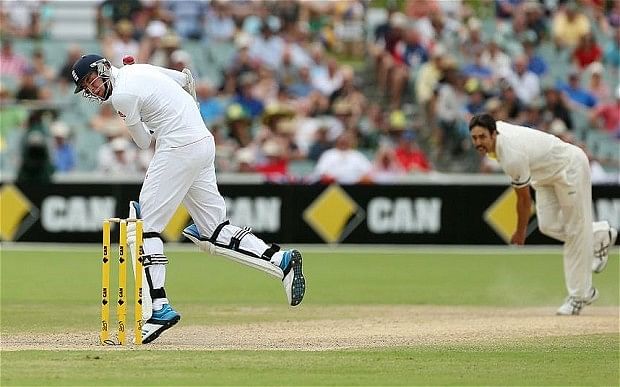
It's not pitch-doctoring, but Mitch-factoring

Ever since the first over was bowled by the belligerent Australian fast bowler Mitchell Starc to the circumspect English batsman Adam Lyth on the first day of the 2015 Ashes test in Cardiff, fans and media have whined and complained about the slow and sluggish pitch. Ex-England captain Michael Vaughan soon tweeted that “this was a very very poor cricket pitch”. Others argued that it would make for dull cricket. Some disappointed Australian fans even aggrieved that the pitch had been doctored to England’s liking, to blunt the menacing threat of Mitchell Johnson.
Four days hence, after Australian batsmen meekly succumbed to England’s more efficient and guileful bowling attack, the cries grew louder and louder. The next day, Australian coach Darren Lehmann at the press conference, not-so-subtly appealed the Lord's ground staff to produce a quicker pitch to aid his quicks.
But here’s a thought.
Why would they? What did Australia expect? Lively pitches with pace and bounce?
England has the right to decide on the nature of pitches
Having seen Australia's recent struggles in India, U.A.E. and, to an extent even in the Caribbean, slow pitches with low bounce was definitely the way to go. It's not pitch doctoring but Mitch factoring. England's best way to regain the urn is by providing conditions which suit themselves more than the opposition. That's what home advantage is all about and there's nothing shameful or shocking about that.
When India toured England last year, bar the pitch at Trent Bridge, all the pitches were green with considerable bounce and swing. Why? It suited England’s strengths and nullified India’s. That’s the maxim of pitch conditions. It’s supposed to benefit the home team and challenge the visiting team. If they’re good enough, they’ll surmount the hosts. This has been the case throughout the history of cricket.
Providing quick and bouncy pitches will help Australia’s cause, rather than England’s. Considering how badly England were beaten in the previous Ashes and why they were beaten, slow pitches were definitely warranted from England’s perspective. One could argue that it might not make for competitive cricket – at least, not in the eyes of Lehmann and the Australian fans. And hey, they may be right. But it does not help England’s chances if they produce such wickets. Producing pitches with low bounce that negate the Australian threat, does.
What can Australia do to counter this?

Australia's fortunes were terribly hurt by the pre-Ashes blow in the form of Ryan Harris' retirement. In English conditions, Harris' bowling will be sorely missed by Australia. His nagging line and length makes it tough for batsmen to score, as was evident in his Man of the Series performance in the previous tour of England. Add to that the fact that Mitchell Johnson is not half as effective without Harris.
The Harris-Johnson combo is like a scene from a horror film. Ryan Harris is the long, uninterrupted camera shot which builds pressure and a sense of dread of something horrific about to come. Something horrific in Mitchell Johnson. And now, without Harris, Johnson is just a B-Grade horror film with fast, cheap thrills.
In 16 tests together, Johnson has taken 89 wickets at an average of just under 21. Without Harris, his average increases to almost 32.
If Australia need to come back this Ashes, they need Johnson to find a way to be effective without the aid of Ryan Harris. Josh Hazlewood may not yet have the skill of Harris but his accuracy can help Australia tie one end up, while Johnson and Starc attack from the other.
The batsmen need to step up. While playing away from home, more often than not, you’re bound to come across conditions not to your liking. Being international players, you need to be able to adapt to different conditions and not look clueless and get beaten so appallingly.
Pitch doctoring, Mitch-factoring or otherwise, this is the only way Australia can avoid yet another Ashes defeat in England. After a 5-0 whitewash and World Cup victory, that would be quite unflattering.